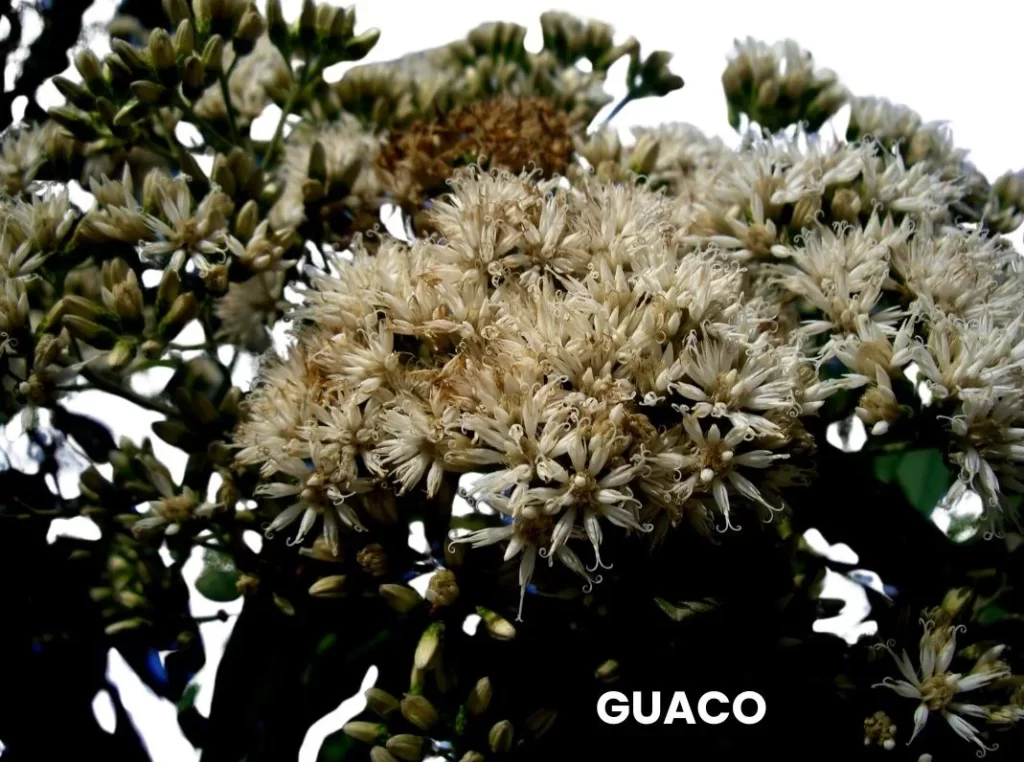Guaco, scientifically known as Mikania, is a climbing plant commonly referred to as Climbing Hemp Weed.
It has a long history of medicinal use, particularly in South America, where it is valued for its various therapeutic properties.
In homeopathy, Guaco is used primarily for its effects on the nervous system and female reproductive organs, and as an antidote to bites from scorpions and serpents.

Table of Contents
ToggleSOURCE INFORMATION
Scientific Classification
- Kingdom: Plantae
- Clade: Tracheophytes
- Clade: Angiosperms
- Clade: Eudicots
- Order: Asterales
- Family: Asteraceae
- Genus: Mikania
- Species: M. glomerata / M. guaco
Origin
- Guaco is native to Central and South America, where it grows abundantly in tropical and subtropical regions.
- The plant is a perennial vine that thrives in moist, wooded areas, often climbing trees and shrubs.
Historical Facts
Traditional Uses
- Indigenous peoples of South America have used Guaco for centuries as a remedy for snake bites and to treat respiratory conditions.
- The plant was introduced to European medicine in the 17th and 18th centuries, where it gained a reputation as an effective treatment for a range of ailments, including fevers and inflammation.
Homeopathic Introduction
- Guaco was incorporated into homeopathic practice in the 19th century, where its use was expanded to include treatments for nervous system disorders, spinal irritation, and specific female health issues.
DRUG PATHOGENESIS
Guaco acts primarily on the nervous system and female reproductive organs.
It is known for its effectiveness in treating symptoms of paralysis, spinal irritation, and respiratory distress.
Additionally, it serves as an antidote for scorpion and snake bites.
KEY CHARACTERISTICS
- Nervous System: Effective for paralysis, particularly bulbar paralysis, and spinal irritation.
- Female Reproductive System: Treats conditions like leucorrhoea (vaginal discharge) that is copious, corrosive, and putrid.
- Antidote: Used for bites of scorpions and serpents.
- Digestive System: Alleviates symptoms of cholera and dysentery.
DETAILED ORGAN SYMPTOMS
HEAD
- Headache: Persistent headaches that are often accompanied by a flushed, red face, indicating increased blood flow or irritation.
- Tongue Heaviness: The patient experiences a heavy feeling in the tongue, making it difficult to move or articulate words properly.
THROAT
- Constriction: There is a sensation of tightness or constriction in the larynx and trachea, which can make swallowing difficult and uncomfortable.
- Heavy Tongue: The heaviness of the tongue extends to the throat, complicating speech and movement due to a feeling of weight or numbness.
FEMALE REPRODUCTIVE SYSTEM
- Leucorrhoea: The patient has a profuse vaginal discharge that is corrosive, causing irritation to the surrounding tissues, and has a putrid smell, indicating infection or severe imbalance.
- Itching and Smarting: At night, there is a severe burning and itching sensation in the vaginal area, described as feeling like fire, which disrupts sleep and causes significant discomfort.
URINARY SYSTEM
- Increased Urination: The patient urinates more frequently, and the urine is cloudy and contains phosphates, suggesting a metabolic or kidney issue.
- Bladder Pain: There is persistent discomfort or pain in the bladder region, which may be exacerbated by the frequent urination.
BACK
- Pain Between Shoulder Blades: There is notable pain that starts between the shoulder blades and extends down to the forearm, indicating nerve involvement or muscle strain.
- Burning Sensation: The nape of the neck and shoulders feels like it is burning, which can be due to inflammation or nerve irritation.
- Spinal Pain: The pain along the spine worsens with bending, suggesting spinal inflammation or nerve root irritation.
- Weariness: There is a general sense of fatigue and heaviness in the hips and lumbar region, making movement and activity difficult.
EXTREMITIES
- Deltoid and Shoulder Pain: Intense rheumatic pain in the shoulders, elbows, arms, and fingers, which can limit mobility and cause significant discomfort.
- Hip Pain: There is a deep, aching pain around the hip joint, possibly affecting the patient’s gait and ability to walk.
- Heaviness in Legs: The legs feel unusually heavy and painful, particularly in the ankle joints and soles of the feet, which can lead to a feeling of lameness.
- Paralysis: There may be paralysis of the lower extremities, indicating severe nerve damage or dysfunction.
MODALITIES
- Worse: Symptoms worsen with motion.
RELATIONSHIP WITH OTHER DRUGS
- Comparatives: Oxalic acid (Oxal ac), Lathyrus (Lathyr), Causticum (Caust).
DOSE
- Typically administered in the third to sixth potency in homeopathic practice.
Frequently Asked Questions (FAQs)
What conditions is Guaco commonly used for in homeopathy?
- Guaco is used for nervous system disorders, female reproductive issues like leucorrhoea, antidotes for scorpion and snake bites, and symptoms related to spinal irritation.
How is Guaco prepared in homeopathy?
- Guaco is prepared through a process of serial dilution and succussion, creating a homeopathic remedy from the plant’s extract.
What are the key symptoms indicating the use of Guaco?
- Key symptoms include heaviness and difficulty moving the tongue, constriction in the throat, profuse and corrosive leucorrhoea, spinal pain, and paralysis of the lower extremities.
Can Guaco be used for respiratory issues?
- Yes, Guaco can alleviate symptoms like tightness in the larynx and trachea, which are associated with respiratory distress.
Glossary of Difficult Words
- Antidote: A remedy to counteract the effects of poison.
- Bulbar Paralysis: A condition where there is progressive weakness and wasting of the muscles involved in swallowing, speaking, and breathing.
- Leucorrhoea: A thick, whitish, or yellowish vaginal discharge.
- Larynx: The part of the respiratory tract containing the vocal cords.
- Phosphatic: Relating to or containing phosphates, often referring to the composition of urine.
- Deglutition: The action or process of swallowing.
- Sacrum: The triangular bone at the base of the spine, forming part of the pelvis.
- Deltoid: A large triangular muscle covering the shoulder joint.
- Nates: The buttocks.
- Lathyrus (Lathyr.): A homeopathic remedy derived from the chickling vetch plant, often used for motor nerve paralysis.
This comprehensive overview of Guaco provides detailed insights into its origins, historical uses, and symptomatology for homeopathic practice.
